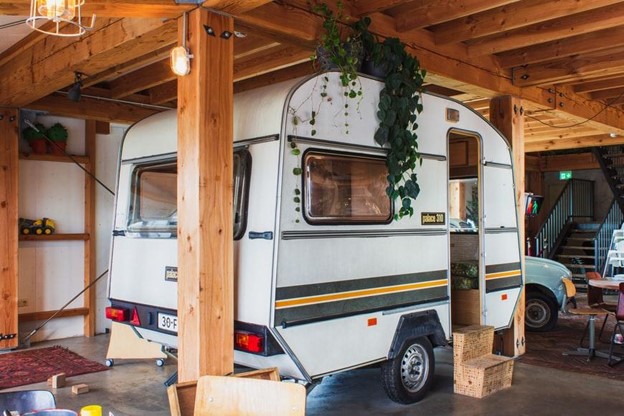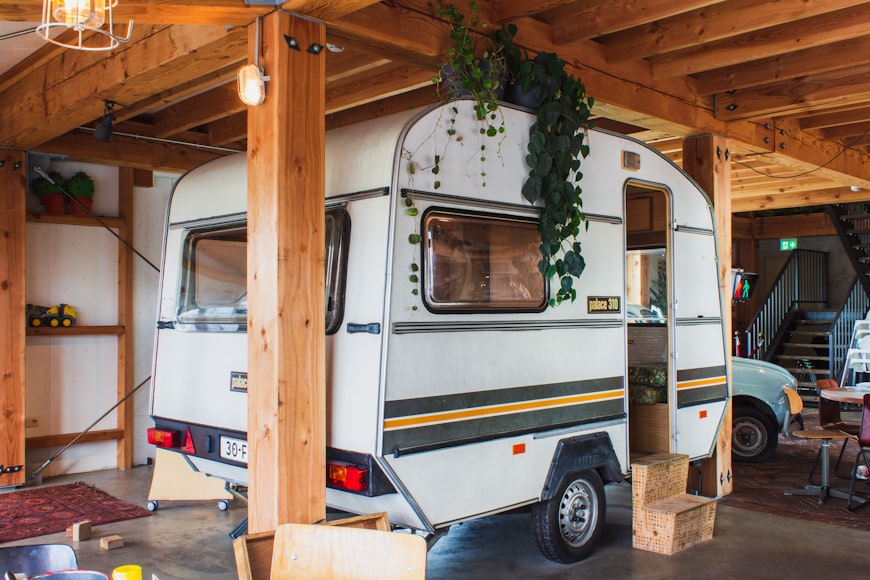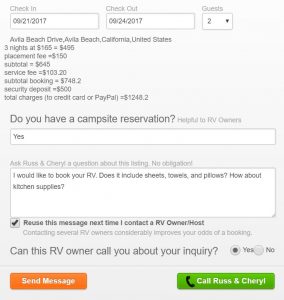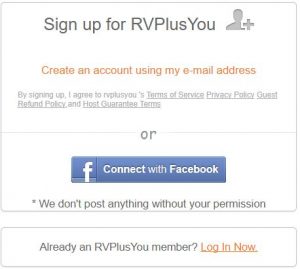Buying a motorhome or travel trailer opens the door to unlimited adventures. You’ll have the freedom to roam where you want, when you want, and for how long you want. And you get to see parts of the world of which others can only dream.
But there comes a time when your home on wheels needs to take a break and go into storage. Maybe you’re waiting for the snowy winter months to pass, or family or work obligations are forcing you to break camp and head home for a while.
So, how do you minimize your RV storage costs?
Whether you’re looking for short-term storage or a longer-term solution, this guide will go through some amazing money-saving RV storage tips. Keep reading.
First, How Much Does it Cost to Store an RV?
Depending on the type of RV you own, it can cost anywhere between $75 to $250 per month to store your RV in a dedicated storage facility. But many factors affect RV storage rates. Below is a breakdown of the various factors that influence storage fees, so you can know how much it will cost to store your RV.
Factors that Affect RV Storage Facility Fees
- Indoor or Outdoor Storage Facility – Indoor sites, where your RV is under a shelter, typically cost more than $100, some over $400. Outside sites, where your RV is parked on an open lot, usually cost between $30 and $100. Expect to pay $70 to $200 each month for outdoor sites that have a cover, such as a carport or a canopy.
- Location – Monthly storage rates differ widely from state to state. In high population areas, with limited space, and near popular RV destinations, the costs are significantly higher because of storage demand.
- Amenities – A temperature-controlled indoor storage with cameras throughout, 247 on-site security, electricity, water, a dump station, and a pest prevention program will cost more compared to a bare-bones yard that is fenced and locked, without on-site personnel.
- Size of RV – The size of your motorhome or towable also impacts the fees you’ll pay. A giant Class A(bus-like rig), for example, will require a greater amount of storage space than a campervan.
Best Ways to Save on RV Storage
Where can I store my RV for cheap? This is one of the most commonly asked questions when it comes to RV storage. Thankfully, we’ve gathered the most useful money-saving tips for storing your RV.
Store at Home
Your home is hands down the most affordable place to store your RV. If you have the space, you can park an RV on your property and avoid paying any monthly RV storage fees. By keeping your RV within view, it’s easier to perform routine maintenance, you can travel at a moment’s notice, plus you can use it as a place to cook, sleep and hang out when guests come over.
Unfortunately, this option isn’t always available to people who live in homeowners’ association (HOA) neighborhoods. Most associations don’t always welcome recreational vehicles onto the property because they say RVs can be an eyesore. Some, however, allow you to park your RV as long as it can’t be seen from the street.
Make sure your neighborhood doesn’t have any city parking law or HOA covenants that might bar you from keeping your RV at home. But if there are no restrictions, there’s good security in your area, and you have ample space, you can store your rig at home using any of these options.
- Driveway – This option is only feasible if the driveway is big enough to allow easy and safe RV parking, and without blocking other smaller cars that need to park there.
- Garage – Standard size garages will be able to fit most campervans and small trailers. It offers more protection from criminals, as well as from the elements. But that comes at the cost of losing your precious tools’ storage space.
- Backyard or Side Yard – If you have a big backyard, you can keep your rig here, away from the neighbors’ prying eyes. Just make sure you protect it with a high-quality RV cover.
- Carport or Canopy – You can build an RV pad or concrete slab and erect a structure to house your RV in the backyard. A carport or canopy will provide significant coverage for your trailer, although not as much as an enclosed structure. Building a shed can cost between $2,500 to $10,000.
Park at a Friend’s Property
Another cost-free way to store your RV is to park it in a friend’s or relative’s place. If you are close with someone who has an extra garage, a large parcel, or a decent enclosed shed, you might have the advantage of asking to store your RV on their property until you’re ready to use it again. You’ll save money and have peace of mind knowing your buddy will keep an eye on your investment.
Some RVer’s even opt to keep their rigs on their friend’s hobby farms. Before storing your RV in a barn, make sure there’s always someone around and the structure is strong enough and well maintained. Also, ensure it isn’t sheltering animals and doesn’t house any stuff that would attract rodents. Offer some cash each month or do something nice for your friend to show your appreciation.
Find an RV Storage Facility Outside Town
If there’s no space on your property to accommodate a parked RV for the long term, and you can’t find a generous friend or neighbor, consider facility storage outside town. Sites outside the city limits are cheaper, due to less demand.
Ideally, the facility should have easy access to a highway or interstate. Make sure it’s a place other RVers trust. Look for perks such as covered sites, video surveillance, a security gate, and round-the-clock on-site personnel.
Park at a Campground or Fairground
If you need short-term storage, some campgrounds do have a section set aside for the storage of RVs. In many places, the rate for keeping the RV at the campground will be much lower than the daily, weekly, or monthly rate for camping since you aren’t using amenities.
Using campground storage makes sense if you’re just heading out for a few days or a couple of weeks. Call a few RV parks in your area for rates and availability, and make sure you verify the terms in advance. Some local fairgrounds also offer affordable opportunities for both indoor and outdoor RV storage.
Peer-to-Peer Storage
An app like Neighbor, matches people who want to rent out idle space with people looking for storage room. Use it to discover neighbors willing to allow RV parking at their location. Just enter the zip code where you want to store the RV and explore the options.
Although RV storage on private property is 30-50% cheaper than conventional storage facilities, take your time before committing. Visit the place, assess whether your RV will be safe enough, and learn whether you can access your camper whenever you want to.
Local Forums and Service Clubs
Local RV forums and active Facebook groups are also great places to find inexpensive local RV storage. By simply asking, you might find someone within your town who has extra space. Also, don’t underestimate the power of word-of-mouth recommendations.
Check out your local Elk’s Club and talk to your friends, neighbors, or members of your RV community can have valuable information that could help you locate affordable places to store your RV close to you.
RV Repair Shop
When was the last time your rig got a full check-up? If you need to go away for some time, maybe on a non-RV vacation, or to attend an urgent work meeting, conference, or family emergency, you can leave your camper in the hands of an RV shop.
Here, they can catch up on maintenance or work on your long-awaited remodel project. Depending on the size of the project, the RV can stay at the shop for a few days or even weeks without you worrying about security.
Another Alternative is to Rent Out Your RV
Instead of storing your RV, why not rent it out? Renting out means zero storage fees, and it helps prevent rodent and weather damage that occurs when a camper sits idly. Plus, an RV’s mechanical and electrical components run better when used frequently. More importantly, you get to earn a substantial income.
If you don’t feel comfortable letting a stranger drive your precious baby, we have a solution you’ll love–delivered and set up RV rentals. Here, you drive the RV to the campground yourself, set it up, and the renter only uses it to camp. So you never have to worry about someone inexperienced steering your investment on a busy highway or curvy road.
Don’t want to do the work? No problem. We’ll help you find an RV Rental Manager. Before you go down that road, use the resources on our site to investigate what it takes to do it yourself. Use our site, RVPlusYou to list your camper and be found by people interested in RV rental delivery and set up. Talk to prospective renters and see if DIY is for you.
Storing an RV can Be Inexpensive if You Know Where to Look
RV storage costs can quickly add up if you don’t pick a storage location wisely. To cut expenses, explore other storage alternatives such as keeping your camper at home, a campground, a friend’s, or a nearby site you discover through peer-to-peer storage sites.
If you have to use a conventional storage facility, choose one outside town as they cost less. Just make sure the storage option you pick has ample security, will protect your rig from the elements and doesn’t break HOA or local rules.











